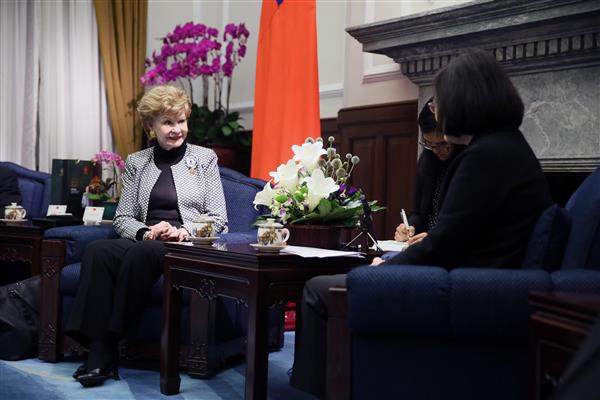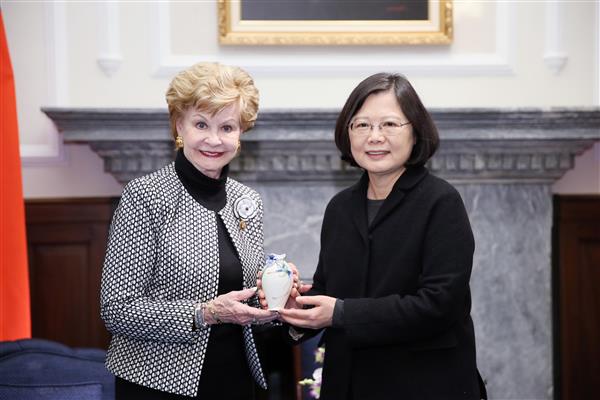News & activities
 News releases
News releases
President Tsai Ing-wen met on the morning of December 15 with a group of foreign scholars and government officials who were in Taiwan to take part in the 6th ROC (Taiwan)-U.S.-Japan and Asia-Pacific Regional Partners Security Dialogue. In addition to warmly welcoming the visitors to Taiwan for the Security Dialogue, President Tsai also briefed them on Taiwan's promotion of its New Southbound Policy as a means of enhancing the diversity of its links with the countries of the ASEAN region and South Asia, and spoke about the government's proactive efforts to strengthen its partnerships with the United States, Japan, and the countries of the Asia-Pacific region.
In remarks, President Tsai first thanked the visitors for coming to Taiwan to attend the Security Dialogue. She then followed up by thanking the organizers of this year's event—the Prospect Foundation, the Center for a New American Security (CNAS), and Japan's Institute for International Policy Studies—for their painstaking preparations and collaboration. In recent years, said the president, more and more government officials and scholars from countries throughout the region have been attending the Security Dialogue, and she expressed hope that it will continue to be an important forum that exerts a positive influence on regional development.
President Tsai stated that the accelerating pace of change in political, economic, and security conditions in the Asia-Pacific region means that the challenges faced by countries in the region are becoming increasingly serious and complex. At the same time, she expressed confidence that this kind of dialogue can foster mutual understanding and trust around traditional and non-traditional security threats, economic integration, and other issues. Taiwan will also continue to be a "proactive communicator for peace," she said, by maintaining mechanisms for close and regular communications with all parties involved, and by continuously exchanging views and boosting cooperation on important political and economic developments.
The president further pointed out that Taiwan is a "staunch guardian of peace" that will work to enhance its relations with the US, Japan, and other democratic countries as it proceeds with its work on all fronts. Taiwan is willing and able to work with the US, Japan, and its other partners in the region to contribute to the international community and together promote regional peace and stability as well as global prosperity.
Commenting on Taiwan-US relations, President Tsai noted that the two countries are now cooperating under their Global Cooperation and Training Framework, and considerable success has been achieved. Hopefully, she said, Taiwan can work via similar mechanisms with other partners in the Asia-Pacific region to make even more contributions.
President Tsai also told her guests that in order to generate new momentum for growth, Taiwan's government is actively promoting its New Southbound Policy. In the future, Taiwan hopes to engage in mutually beneficial exchanges in such areas as trade, investment, human resources, and culture, thereby enhancing the diversity of Taiwan's links with countries in the ASEAN region and South Asia. At the same time, we also hope to share Taiwan's economic development experience through interactions among government officials, corporate investments, and private-sector cooperation.
And finally, the president once again thanked her guests for coming to Taiwan, providing their valuable insights on conditions in the Asia-Pacific region, and continuing to contribute to regional peace and prosperity. She also voiced hope that she will be able to work together with her guests in the future.
Included in the delegation were Madeleine Z. Bordallo (US congresswoman), Keisuke Suzuki (member of the Japan House of Representatives and director of the Liberal Democratic Party's Youth Division), Dan Blumenthal (Director of Asian Studies at the American Enterprise Institute), Zack Cooper (fellow with the Japan Chair at the Center for Strategic and International Studies), Hideshi Tokuchi (senior research adviser at the Institute for International Policy Studies), Arata Kuno (assistant professor in the Department of Policy Studies at Kyorin University), Minoru Hara (senior research fellow at the Institute for International Policy Studies), Malcolm Davis (senior analyst at the Australian Strategic Policy Institute), Hank Lim (senior research fellow at the Singapore Institute of International Affairs), and Selina Ho (faculty member at the Lee Kuan Yew School of Public Policy, National University of Singapore). The visitors were accompanied to the Presidential Office by Vice Minister of Foreign Affairs Leo Chen-jan Lee (李澄然) and Prospect Foundation Chairman Mark Chen (陳唐山) to meet President Tsai. Also attending the meeting was National Security Council Secretary-General Joseph Wu (吳釗燮).










